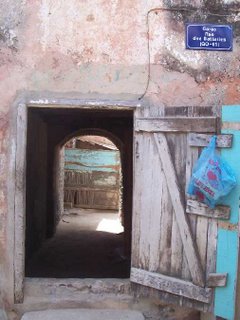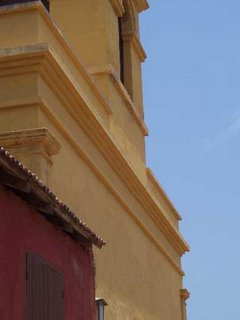I left Senegal with the impression that it was a place I would like living. Two American co-workers and I were able to cover downtown Dakar on foot—it was small enough and the streets were actually sign posted at each intersection! We managed to get around by public bus and their version of a tro-tro (car rapide). I hadn’t anticipated so much rubble, but wasn’t surprised that plastic bags littered every scene—Africa’s plague. There were more beggars—some were young boys working for
marabouts. Islam has a different flavor in Senegal, which I didn't get to understand very well in my short time there. One evening, from a secondary story restaurant, we saw about 20 tattered youth marching down the road in two columns, shouting
Touba Touba, the name of the city where a historical Muslim leader had lived and a major Senegalese holy site.
Most of the refugees we interviewed were black African
Mauritanians, expelled in 1989 by the
Moors (who are considered white, but there are also black Moors who have adopted Moorish culture). The men wear big, flowy gowns in the richest colors—green, indigo, gold—with unlimited cargo space in a kangaroo pouch. Interviewing paused during Friday prayers. Our tall Pulaar-English interpreter wore a red Islamic hat and with his purple gown and curly graying beard, looked like he belongs in the next Harry Potter movie. The Mauritanians are beautiful people--something about their cheeks and the shimmer in their eyes. Though most women loosely cover their hair, they’d whip out a breast in the middle of an interview for a fussy baby.
Sunday was our day off, so we took a ferry 20 minutes to
Ile de Goree. I’d say it was a cute, colorful island, only that seems inappropriate given its history in relation to the slave trade. It had been overrun by crafts and peddlers, but weaving through narrow alleys between brightly painted houses with blooming flowers and 2nd story balconies, it's possible to imagine that must be what Greece is like.
In the afternoon, while wandering Dakar's back streets, we heard drumming from a tent set up in the middle of the block and went to investigate. At first, we assumed it was a marriage. There were 3 or 4 young women wearing black satin dresses with gold flowers up one side. Their tall headdresses were stiff black mesh also accented by gold. Their eyes were made up with gold at an angled swoop that somehow insinuated an evil stepsister. Women took turns dancing a wild, loose dance, often scrunching up their faces or puckering lips and crossing their eyes. It was a baby ceremony and if this were Ghana, the dancing and fish faces would have been to scare away evil spirits. In Senegal, I’m not sure. The women dressed in black were the aunties and always took the floor when there were no other dancers coming forward. The people didn’t seem to pay much attention to us—I think that if we’d been in Ghana, we would have been pulled to the center and made to dance for their amusement.
More than once, when walking down the street together, Senegalese men attempted to strike up conversations with us. At first we’d ignore him or give a curt answer or tell him that we were in the middle of a conversation. Twice, this lead to accusations that we were racist and didn’t want to talk to a black man. It's a clever tactic, because it is bound to ellicit a reaction--possibly even a conversation because the white person doesn't want such a claim to seem true. The second time this happened to us, my colleague shouted back at the man that he only wanted to talk to us because we were white and that
he was the racist.
Over the week, we hit up all the major markets, sometimes more than once. Arriving at one directly from work, we were hungry and knew we’d need to find something to have energy for the shopping ahead. At one street corner, we stumbled upon the familiar cast iron pot full of boiling oil and I fell in love. It looked like yam, but tasted like sweet potato (the orange kind). It may have been yucca (which a google search just confirmed was cassava?!). I was sadly unsuccessful in attempts to find it again! As we got two, then two more, than another two, the Senegalese sitting nearby smiled as they watched us.
The food was a fabulous change from what I can get in Ghana: couscous, fresh fish, yassa sauce (lemon and onions), thiebu djen (the national dish of Senegal with fish stewed in tomato sauce and served with djolof rice cooked with tomato). There was also a discovery that bissap is the same as the karkade/hibiscus goodness I loved in Egypt. And I happily sipped at a sample of the juice from the fruit of a Baobob tree.
More photos here:
http://www.flickr.com/photos/49751577@N00/




